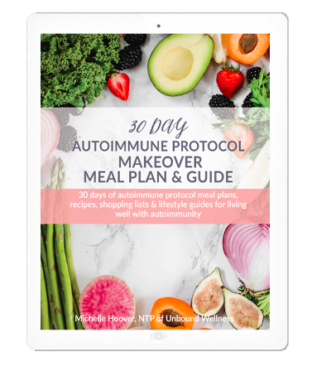10 Stress Relief Tactics for Living Chronic Illness
Recently, I asked my readers what they thought would make their healing journey easier. Recipes, cooking advice, and more health and lifestyle tips were among the most common answers of course, but there was no avoiding that everyone wanted to hear about stress reduction. When I told my husband that this was a common concern that I needed to address here on the blog we both looked at each other thinking that I myself could really use a refresher on this!
I am not immune from the stresses of daily life. Not in the least. On any given day I’m stressed about getting in enough nourishing foods for the day, about getting in some sunshine and movement, stressed about how much sleep I’m getting (or not getting), stressed about every aspect of self-employment… just to name a few.
Regardless of who you are, living with a chronic illness like autoimmune disease comes with a lot of stressors! Being sick is stressful by nature, and trying to get better is stressful as well.
So, what do you do about it? How do you roll with the punches of daily stressors and reduce stress in general?
10 Stress Relief Tactics for Living Chronic Illness
1.Embrace movement
Nothing increases endorphins quite like movement does! Of course, everyone with a chronic illness or autoimmune disease will have a different level of what they’re able to tolerate at any given time. You can still practice movement while honoring and accepting what your body can do.
Here are just a few ideas of movement that may work for you and your body…
- Daily walks
- Yoga
- Pilates
- Swimming
- Weightlifting
- Fitness classes
- Sports (tennis, soccer, volleyball, etc.)
For me, most of my movement these days is walking. Not only does it add in movement, but it allows me to really clear my head which is huge for my stress reduction. I also love yoga and weightlifting! Playing sports is more of a stressor than a stress reliever to me… but we’re all different 😉
2. Meditation and prayer
Meditation and prayer earn a top spot on this list because they’re one of the best ways to deal with stress. Meditation practices involve calming down the noise in your mind, and just slowing down for a few moments. That can be incredibly powerful when you’re going through a rough, stressful time.
Prayer is something that I personally practice more so than meditation and I find it to be incredibly stress relieving. Spending time with God, and reassuring myself that I trust Him to guide me through the storm always brings me comfort.
Here are some resources to get you started…
- Meditation apps like Calm or Headpsace
- Yoga Nidra videos on YouTube
- Devotional books or apps
- Guided prayer books or podcasts
3. Practice visualization
This has been one of my favorite stress relief tactics recently that’s a bit more out there, but bear with me! Visualization is picturing a relaxing scenario in your mind to where you can take a step back from your current situation for just a few minutes. Of course, we still have to come back to reality and face the stressor head on, but taking a tiny break can revitalize our energy!
Visualization can be as involved as doing a guided prompt, or as simple as just picturing a place that you love and sitting in silence for a few moments. It can be picturing yourself at the beach on a warm summer day when you’re fed up with a cold winter or visualizing yourself spending time with a loved one when you’re feeling lonely. When I used to be stressed at a fulltime job, I would take an extra second washing my hands in the warm water in the bathroom and picture myself on vacation feeling the water of a hotel pool. Yes, that literally lasted 10 seconds, but it was often enough of a happy moment to get me through the last 2 hours of a monotonous day!
Another way to practice visualization is to visualize yourself on the opposite end of the problem you’re currently facing. How do you feel being out of it? What is life like now that this stressor is gone? Picturing your life after the stressor is passed is one of the best motivators to get through it.
4. Spend time in nature
Spending time outside is proven to support our health and wellbeing for a multitude of reasons. Of course, we’re less likely be sitting and spending time immersed in technology while we’re spending time in nature, but there are also benefits to breathing fresh air, getting sunlight, and being around trees and plants.
Make plans to take a walk on a nearby hiking trail or in a park at least once a week when weather permits! Taking a short trip to a cabin is another amazing strategy when you really need an extra boost of nature.
A hack for adding more nature to your life is bringing the outside in with plants! Of course, it doesn’t replace actually getting outside, but every little bit helps.
5. Start a gratitude practice
Staying grateful for what we already have is one of the best ways to relieve stress. It’s hard to be stressed for that long about that flat tire that we need to go replace when we practice gratitude for the fact that we weren’t hurt on the highway in a blowout.
Something I’ve tried to do in the past is kept a physical gratitude journal, and it was incredibly powerful. Not only was it helpful to write down what I was grateful for at the moment, but it was amazing to go back and read everything I had written in the past. Recently, I’ve been doing this on my phone, but I really need to start keeping a journal again!
I highly recommend picking up a daily gratitude practice or writing in a gratitude journal weekly. It’s something you wouldn’t regret doing!!
6. Help others
The self-help and health world is very focused on self-love right now. It’s all about putting yourself first, and pushing others expectations aside… which is great! We do need to fill ourselves up first. There’s no way we can pour from an empty cup.
However, in our constant pursuit of self-love, sometimes we can lose sight of loving others. Turning our focus outward and helping those around us not only accomplishes the goal of actually helping someone but it washes away our own stresses and zeros our focus in on improving the lives of others. It’s a lot harder to stress over all of the dishes you have to do at home when you’re out helping a family member move, volunteering your time at an animal shelter, or even just giving a good friend a shoulder to cry on.
Helping others and being a good steward of our time here on earth is one of the most beautiful things we can do as a human being. I know, it sounds overwhelming, but here are some simple ideas to get started …
- Bring a meal to a sick friend
- Host a free community class on something you’re an expert on
- Volunteer at an animal shelter or adoption event (it could be as simple as walking dogs!)
- Mentor someone (a teenager, a college student, or someone who wants to be where you are)
- Just be a good friend… never goes out of style!
7. Embrace community support
Helping others comes back around to others helping you! There’s nothing like having a strong network of friends, blood relative family, church family, or other to
When someone offers to help, you don’t have to be too proud to accept it. Accept help! Especially when you’re going through a flare or hard time with your health.
8. Play, explore, and take breaks
In my opinion, the fact that we stop play as adults is just one of the many reasons why we’re so stressed out. Kids know how to drop worries and just have fun, but as adults, we feel like we have to much to do for that. Yes, we have to find time to play, but we also have to make time.
Here are just a few ways you can do this…
- Go to a show, concert, or movie
- Read books at a bookstore
- Go to a local zoo, museum, or botanical garden
- Revisit your old favorite hobbies
9. Form a stress reduction routine
One of the biggest issues with stress reduction is that we feel like we don’t have time. The only way we can have time is to make time, and make it a habit and routine!
Here’s a brief outline of what my own routine looks like…
- Daily movement
- Daily prayer
- Self care practices weekly (taking time for hobbies, lazy afternoons, etc.)
- Weekly gratitude practice
- Weekly time spent at church
- Time with my family/community at least once a month, and quality time with my husband at least twice a week
- Helping others when I can (honestly, I need more of this!)
- Meal prep on Sunday to take away the stress of food prep throughout the week
10. Recognize that stress is all about how you deal with it
I saved the best and most important for last. There is no eradicating stressor from your life altogether. There’s just no getting around traffic, delayed flights, fender benders, broken toilets, and sprained ankles. It’s all about accepting the stressors when they come, and dealing with them accordingly!
That’s easier said than done, I know… I’m telling this to myself here too.
But rather than asking “why me?!” and having the world stop every single time there’s a stressor, step back and say “how do I best deal with this?” Every situation is unique, and that answer will always vary. But facing stress head-on, accepting it, and dealing with it accordingly is the only way to make it manageable long term. The only way out is through, and having a positive outlook throughout stressful situations is the best way to remain healthy and happy.








Thanks! And thanks for sharing your great posts every week!
thank you so much!
Thanks, Michelle !
I’d like to add one more suggestion (which I’m trying to do with our 90 yr old aunt and 24/7 care team):
**look at art !
Even calendar pictures, kids picture books, and on-line art feeds.
—Very rejuvenating, body and soul, mind and spirit !
LOVE THAT! Such good advice. Thank you for sharing, Leslie <3
i like this article so much, it has a lot of info i need to know, thanks for sharing